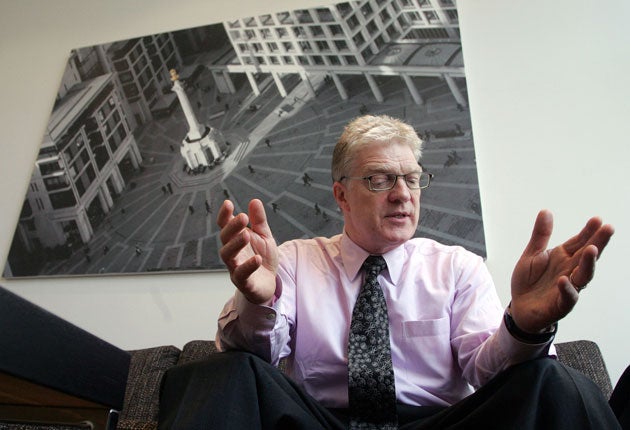Creativity 'tsar' attacks schools ministers
Career politicians are 'refusing to listen to the people who know best'

Your support helps us to tell the story
From reproductive rights to climate change to Big Tech, The Independent is on the ground when the story is developing. Whether it's investigating the financials of Elon Musk's pro-Trump PAC or producing our latest documentary, 'The A Word', which shines a light on the American women fighting for reproductive rights, we know how important it is to parse out the facts from the messaging.
At such a critical moment in US history, we need reporters on the ground. Your donation allows us to keep sending journalists to speak to both sides of the story.
The Independent is trusted by Americans across the entire political spectrum. And unlike many other quality news outlets, we choose not to lock Americans out of our reporting and analysis with paywalls. We believe quality journalism should be available to everyone, paid for by those who can afford it.
Your support makes all the difference.A withering attack on the way successive ministers have run Britain's schools is delivered today by the man chosen by Labour to head an inquiry into promoting culture and creativity.
In an interview with The Independent, Sir Ken Robinson attacked "the career politicians at the Department for Education" and described the schools system as "19th-century". He said education secretaries were "almost all of them looking for one or two significant initiatives which will deliver very prompt results – and then move on to another ministry. They almost all resolutely refuse to listen to the people who do the work in the classroom."
He added: "Our present education system was designed not even for the last century but for the 19th century. Kids living in today's world need something completely different.
Sir Ken, an author and former professor of arts at Warwick University, was talking on the 10th anniversary of the publication of his report which called for more emphasis on developing pupils' creativity and individual talents. Now living in California, from where he advises other countries how to move towards a more creative curriculum, he is in the UK for a seminar organised by the London Business Forum. His visit could not be more timely because the Government and teaching unions are at loggerheads over how to deliver the curriculum.
The National Association of Head Teachers and National Union of Teachers are threatening to boycott national tests next year on the grounds that too much classroom time is taken up teaching children how to pass the tests. But the Schools Secretary Ed Balls is standing firm, insisting that the tests for seven- and 11-year-olds must be delivered.
Sir Ken said he was saddened that education debate in Britain "reverts to this pantomime where people through intellectual mud pies at each other".
"The core truth is that children only learn if they're enjoying it and see relevance in what they're doing," he said. "All children learn differently. Some kids learn best when they're listening and others when they're doing. But what they get is based on learning certain types of factual knowledge which may well be almost obsolete by the time they start looking for a job."
The report by Sir Ken's high-powered committee was "inconvenient" for Labour, he said. "You cannot raise standards by saying 'Let's parachute books into schools and see if anybody reads them' or 'Let's put in some maths books and see if anybody likes them'. You have to develop children's creativity and that's not... allowing them to run wild on a Friday afternoon. It's about developing talents which will be benefit the economy.
"That means developing a curriculum where there are not just 10 subjects in the world and nothing else matters, as the national curriculum says, great teaching and assessment which is not about payment by results, where teachers are terrified about crossing a line. If you look at all the great architects and the great musicians, the thing about them is that they are different and a great school is not a great school because it looks like all other good schools.
"What we need from government, though, is a much lighter touch and more freedom for schools to take charge of delivery."
Join our commenting forum
Join thought-provoking conversations, follow other Independent readers and see their replies
Comments